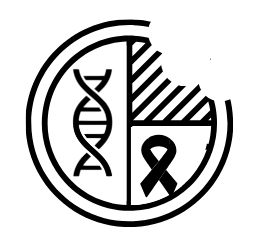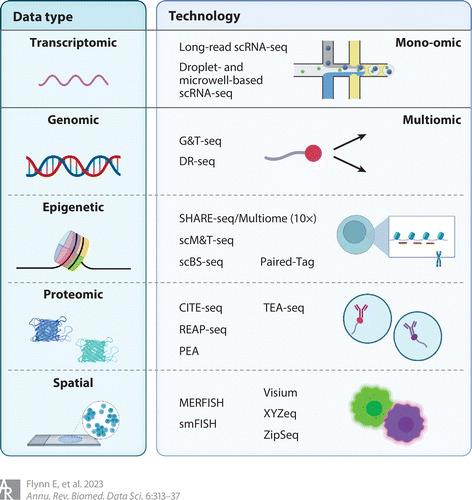Reading time: 4 minutes
Susan Egbert
In the ever-evolving landscape of cancer research, scientists are delving deeper into the complexities of cancer biology. One of the cutting-edge approaches transforming the field is the integration of multi-omics technologies. Multi-omics, the comprehensive analysis of various biological molecules such as genomics, transcriptomics, proteomics, metabolomics, and epigenomics, provides a holistic understanding of cancer at the molecular level.
Understanding Multi-Omics
Multi-omics involves the study of various biological molecules to grasp the intricacies of diseases like cancer. Genomics explores an organism’s complete set of genes, offering insights into genetic variations and heredity. Transcriptomics focuses on RNA transcripts, shedding light on gene expression patterns and active biological processes. An example of a technique used to study transcriptomics is single-cell RNA sequencing (scRNA-seq), which enables researchers to analyze gene expression at the single-cell level, providing unprecedented insights into cellular heterogeneity and revealing previously hidden patterns of gene expression within complex biological systems. Proteomics delves into proteins, the molecular machines of cells, revealing their structures, functions, and interactions. Metabolomics examines small molecules, providing a snapshot of biochemical processes and insights into an organism’s physiological state. Lastly, epigenomics studies heritable changes in gene function without altering DNA sequences, uncovering the influence of environmental factors on gene activity. An example of a technique used to study epigenetics is paired-tag sequencing (Paired-Tag), a cutting-edge method that combines chromatin immunoprecipitation (ChIP) with high-throughput sequencing. Paired-Tag sequencing allows researchers to identify histone modifications and DNA-protein interactions at specific genomic loci, providing detailed insights into the epigenetic regulation of genes and elucidating how chromatin modifications influence various biological processes.
Personalized Cancer Diagnosis and Treatment
Multi-omics technologies have revolutionized cancer diagnosis and treatment by enabling personalized approaches. By analyzing a patient’s genetic, transcriptomic, and proteomic profiles, oncologists can identify specific mutations or alterations driving the cancer. This information helps design tailored treatment strategies, ensuring that patients receive therapies that target the unique molecular characteristics of their cancer cells. Personalized treatment not only enhances the effectiveness of therapies but also minimizes side effects, improving the overall quality of life for cancer patients.
Early Detection and Prognostic Insights
Early detection is crucial for effective cancer management. Multi-omics technologies empower researchers to identify biomarkers indicative of cancer presence at an early stage. By analyzing the molecular signatures of cancer cells, scientists can develop highly sensitive diagnostic tests. For instance, specific proteins like CA-125 for ovarian cancer or PSA for prostate cancer, and genetic mutations such as BRCA1 and BRCA2 for breast cancer, serve as important biomarkers for early cancer detection. Moreover, multi-omics data provide valuable prognostic insights, which help predict disease progression and recurrence. Early intervention based on these insights can significantly improve patient outcomes and increase survival rates.
Unraveling Cancer Heterogeneity
Cancer is not a singular disease; it is a collection of diseases with diverse genetic and molecular profiles. Multi-omics approaches allow researchers to unravel the heterogeneity within cancer types. For example, a recent study on breast cancer utilized multi-omics analyses to identify distinct subtypes within the disease. By studying the variations in genomics, transcriptomics, and other molecular data, scientists can pinpoint specific genetic mutations, gene expression patterns, and epigenetic modifications that define these subtypes. Understanding this heterogeneity is vital for developing targeted therapies that address the unique characteristics of each cancer subtype, ensuring more effective treatments and reducing the likelihood of relapse.
Advancing Cancer Research and Drug Development
Multi-omics technologies have accelerated cancer research and drug development. By comprehensively analyzing the molecular landscape of cancer cells, researchers can identify novel drug targets and pathways. One notable study, exemplified in Figure 3, focused on investigating the different components of the tumor microenvironment in pancreatic cancer. Utilizing multi-omics approaches, including genomics, transcriptomics, proteomics, and epigenomics, scientists delved deep into the molecular intricacies of pancreatic ductal adenocarcinoma (PDAC). This comprehensive analysis helped identify specific biomarkers associated with resistance and response to treatment, particularly immunotherapy.
The significance of this study lies in its ability to pinpoint biomarkers of resistance and response, guiding the development of strategies to sensitize PDAC to immunotherapy. By understanding the complex interplay of genetic mutations, gene expression patterns, protein interactions, and epigenetic modifications within cancer cells, researchers gained crucial insights. These insights not only facilitated the optimization of existing treatment regimens but also paved the way for the development of personalized combination therapies. This approach, driven by multi-omics data, holds the promise of more efficient and precise treatments, ultimately improving outcomes for patients battling pancreatic cancer and other challenging malignancies.
Conclusion
Multi-omics technologies have ushered in a new era in oncology, providing researchers and clinicians with unprecedented insights into the molecular intricacies of cancer. By integrating genomics, transcriptomics, proteomics, metabolomics, and epigenomics data, scientists can unravel the mysteries of cancer heterogeneity, enabling personalized diagnosis and treatment strategies. As these technologies continue to advance, the future of oncology holds the promise of more effective, targeted, and personalized therapies, bringing hope to millions of cancer patients worldwide.
Edited by Jessica Desamero
References
- Flynn E, Almonte-Loya A, Fragiadakis GK. Single-Cell Multiomics. Annu Rev Biomed Data Sci. 2023 Aug 10;6:313-337. doi: 10.1146/annurev-biodatasci-020422-050645. Epub 2023 May 9. PMID: 37159875.
- Pammi M, Aghaeepour N, Neu J. Multiomics, artificial intelligence, and precision medicine in perinatology. Pediatr Res. 2023 Jan;93(2):308-315. doi: 10.1038/s41390-022-02181-x. Epub 2022 Jul 8. PMID: 35804156; PMCID: PMC9825681.
- Legut M. Multiomics-guided cellular immunotherapies. Nat Rev Cancer. 2023 Jun;23(6):348. doi: 10.1038/s41568-023-00570-w. PMID: 37059823.
- Dar MA, Arafah A, Bhat KA, Khan A, Khan MS, Ali A, Ahmad SM, Rashid SM, Rehman MU. Multiomics technologies: role in disease biomarker discoveries and therapeutics. Brief Funct Genomics. 2023 Apr 13;22(2):76-96. doi: 10.1093/bfgp/elac017. PMID: 35809340.
- Yang S, Qian L, Li Z, Li Y, Bai J, Zheng B, Chen K, Qiu X, Cai G, Wang S, Huang H, Wu J, Zhu Y, Zhangyang Q, Feng L, Wu T, Wu R, Yang A, Wang K, Wang R, Zhang Y, Zhao Y, Wang W, Bao J, Shen S, Hu J, Wu X, Zhou T, Meng Z, Liu W, Wang H, Wang P, Chen L. Integrated Multi-Omics Landscape of Liver Metastases. Gastroenterology. 2023 Mar;164(3):407-423.e17. doi: 10.1053/j.gastro.2022.11.029. Epub 2022 Nov 26. PMID: 36574521.
- Lee J, Hyeon DY, Hwang D. Single-cell multiomics: technologies and data analysis methods. Exp Mol Med. 2020 Sep;52(9):1428-1442. doi: 10.1038/s12276-020-0420-2. Epub 2020 Sep 15. PMID: 32929225; PMCID: PMC8080692.
- Montagne JM, Jaffee EM, Fertig EJ. Multiomics Empowers Predictive Pancreatic Cancer Immunotherapy. J Immunol. 2023 Apr 1;210(7):859-868. doi: 10.4049/jimmunol.2200660. PMID: 36947820; PMCID: PMC10236355.
- Nassar SF, Raddassi K, Wu T. Single-Cell Multiomics Analysis for Drug Discovery. Metabolites. 2021 Oct 25;11(11):729. doi: 10.3390/metabo11110729. PMID: 34822387; PMCID: PMC8623556.


Leave a comment